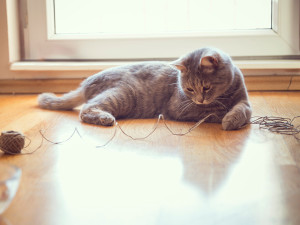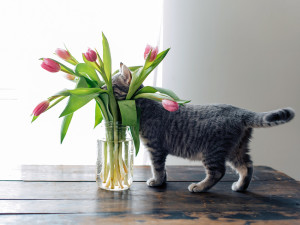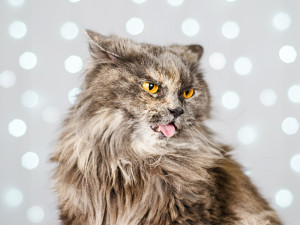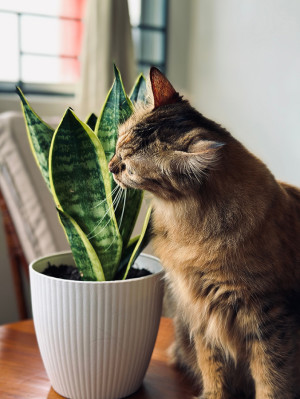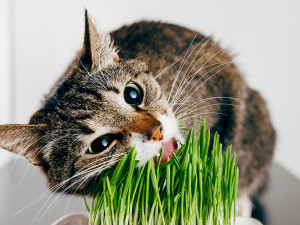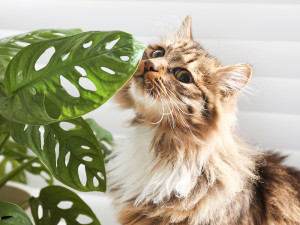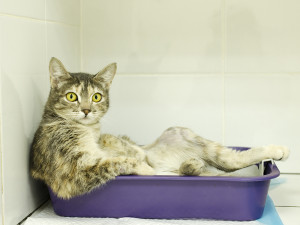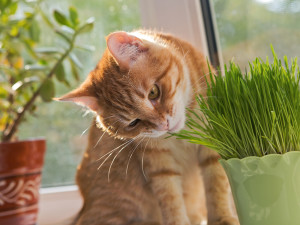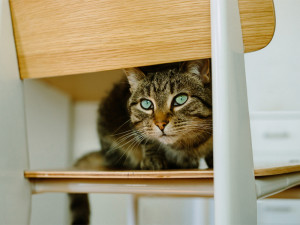Are Orchids Toxic to Cats?
Find out whether you can get that elaborate flower arrangement—or if you should skip it.
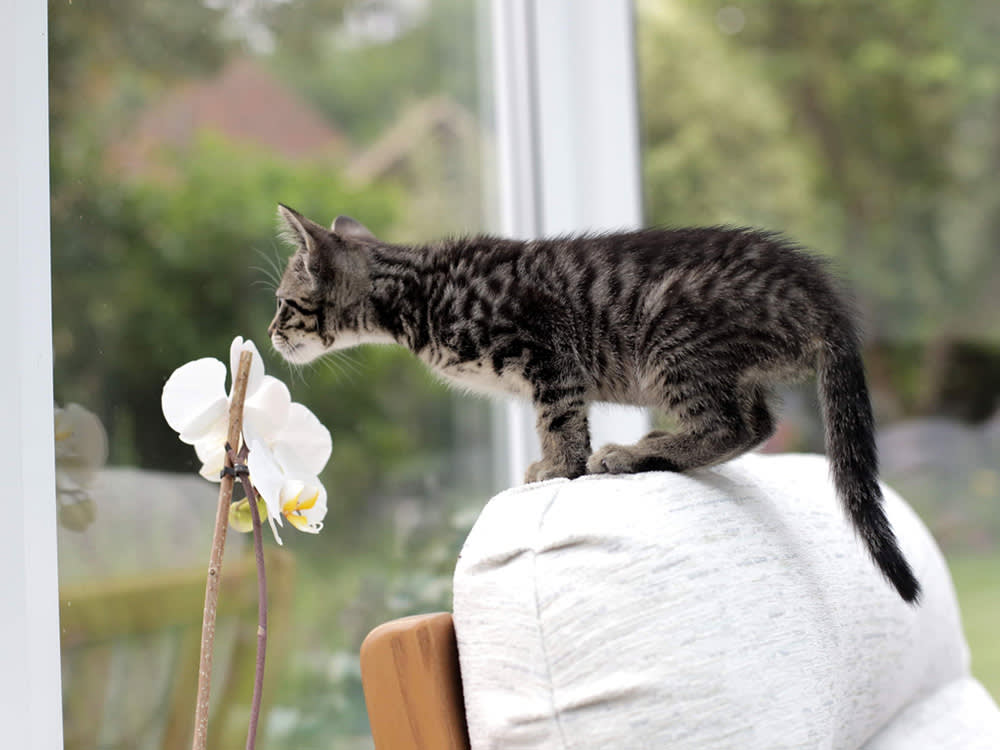
Share Article
Orchids (Orchidaceae family) come in many varieties, and these stunning flowers make a wonderful addition to any garden or bouquet. But cat parents may wonder if orchids are safe to have around their kitties. If you left that corsage that you had to wear to your cousin’s wedding out on the kitchen counter when you got home, don’t worry. Orchids are non-toxic to cats and are safe to have around them.
Are orchids dangerous to cats?
Orchids do not contain any substances or chemicals considered toxic to cats. That doesn’t mean that cats can eat them freely, though. Any plant that a cat eats has the potential to upset their stomach. Cats should be discouraged from eating orchids and any other plants they may show interest in.
What should I do if my cat has eaten an orchid?
If your cat has eaten an orchid, the best course of action is to keep a close eye on them. Most cats will not have any adverse effects from eating a small amount of the plant, but some can show signs of gastrointestinal upset. An episode or two of vomiting that brings up the plant material isn’t unexpected and should not be a problem as long as your cat bounces back to normal soon after.
Cats who continue vomiting, develop diarrhea, stop eating, or seem depressed should be checked out by a veterinarian. It could be that the plant material is causing a problem, or it could be another issue entirely. Either way, getting them checked out to see if they need some rehydration or anti-nausea medication is the best way to get them feeling better quickly.
Diagnosing plant poisoning in cats
Cats are naturally curious and are often tempted to chew on new objects in their area. Plant poisoning in cats is most commonly diagnosed with information from observant pet parents. Signs of plant ingestion including witnessed ingestion, telltale bite marks on leaves, or disruption of a plant may point to some feline malfeasance. Fortunately, orchids are not poisonous to cats and are safe to have in their area.
Symptoms of orchid ingestion in cats
Although orchids are non-toxic to cats, eating anything out of the norm can upset a cat’s stomach. Signs of GI upset in cats can include symptoms like:
Vomiting
Diarrhea
Drooling
Loss of appetite
If you know your cat has eaten an orchid, watch closely for these symptoms. Anything beyond an episode or two of vomiting should be reported to your veterinarian to make sure nothing else is going on and no treatment is needed.
Treatment
Some basic treatments may be needed for cats that are showing persistent symptoms after eating an orchid. Your veterinarian may want to rule out other causes of vomiting or diarrhea with testing, which could include blood work or abdominal imaging (like x-rays or ultrasound). If no other cause for the stomach upset is evident, treatment with fluids and anti-nausea medication could be recommended to help your cat feel better more quickly.
How to prevent plant poisoning
The best way to prevent your cat from having problems from eating plants is to keep them out of your cat’s reach. This can be difficult for outdoor cats that are free to explore the blooming flowers in springtime gardens. Keeping your kitties inside is the best way to control what they have access to.
Always check to see if a plant is toxic to cats before bringing it into your house. It’s best to keep all toxic plants out of your house. Cats are sneaky and often find their way into areas that their parents could swear were blocked off completely. Even cat-safe plants should be kept out of their reach as much as possible to prevent tipped vases and chewed leaves.
Are all parts of an orchid safe for cats?
Orchids do not contain any substances toxic to cats. All parts of an orchid are “safe” for a cat to eat, but cats should not be fed orchids or allowed to chew on them. Poorly chewed leaves and flowers are notorious for causing stomach irritation in cats, often resulting in colorful piles of vomit.
How do I stop my cat from eating orchids?
Curious cats will try to taste anything they have access to, so keeping orchids out of your cat’s reach is the best way to keep them from eating the plant. If you see your cat showing any interest in a plant, redirect them onto a toy or game then reward them with a treat to reinforce good behavior.
The bottom line: Are orchids poisonous to my cat?
Orchids are not poisonous to your cat and are safe to bring into a home with cats. Despite this, it’s always best to watch your cat closely when you bring new things into their environment. Keeping a close eye can prevent stomach upset, ruined flowers, and broken vases. Do not allow your cat to drink the water from vases or flowerpots. Fertilizers and stagnant, scummy water can both be dangerous for cats to ingest.
Other plants that are safe for cats
Spider plant (Chlorophytum comosum): Also known as ribbon plants, spider plants have thin, flowing leaves that may help clear toxic substances from the air in enclosed spaces.
Roses (Rosa genus): A bouquet of roses brightens up any day, and you can rest easy having these beautiful flowers around your cats. Just watch out for the thorns because they can still cause scratches.
Calathea (Calathea species): These broad-leaved plants come in a variety of shapes, patterns, and colors. They’re easy to care for and safe to have around cats.
Other plants that are dangerous for cats
Lilies (Lilium species): Often included in flower arrangements, all true lilies (including Easer lilies, tiger lilies, Asiatic lilies, and others) are very toxic to cats. Even a small exposure can result in life-threatening kidney failure for a cat. Always check for lilies before bringing a prepared bouquet into your home.
Tulips (Tulipa genus): Tulips contain toxins that can cause vomiting, diarrhea, abdominal pain, heart issues, and seizures. The toxic substances are most concentrated in the bulb, but all parts of the plant are toxic to cats.
Snake plants (Dracaena Trifasciata): These tall, pointy plants are popular because they’re so easy to care for. Unfortunately, snake plants are toxic to cats and can cause vomiting, diarrhea, drooling, and loss of appetite.
FAQs (People also ask):
What happens if a cat eats an orchid?
Cats that eat pieces of an orchid should not suffer any toxic effects. Although orchids don’t contain any toxins for cats, they can still cause vomiting due to irritation caused by the plant pieces in the stomach.
Are orchids poisonous to cats?
Orchids are not poisonous to cats. They do not contain any toxins that are harmful to cats and can be added to a cat’s environment without concern for toxic effects.
Can cats eat orchids safely?
Cats should not eat orchids. Although orchids are not toxic to cats, they can still cause vomiting and stomach upset because they are not a normal part of a cat’s diet. Cats should be discouraged from chewing on orchids to prevent problems.
Are orchids poisonous to cats if they smell them?
Orchids are not poisonous to cats if they smell them. They do not contain any components that are toxic to cats and are safe for cats to be around. Curious cats can feel free to sniff to their heart’s content.
References:
ASPCA Toxic and Non-Toxic Plants Listopens in new tab

Dr. Bartley Harrison, DVM
Dr. Bartley Harrison, DVM, is a veterinarian with more than nineteen years of experience. He has worked in both large and small emergency and specialty veterinary practices, treating a variety of species; primary interests includes emergence medicine and critical care.
Related articles
![A brown cat with a snake plant.]()
Are Snake Plants Toxic to Cats?
All you need to know about snake plants — plus, other plants that are toxic (and safe).
![Cat chewing on cat grass]()
The 10 Best Non-Toxic House Plants for Cats
Cats love the crunch of a houseplant. These will do them no harm.
![cat sniffing a plant]()
Household Plants That Are Toxic to Cats
These plants might be beautiful, but they’re deadly to feline foragers.
![cat sitting in a litter box]()
How to Deal with Cat Diarrhea
Dr. Audrey K. Cook’s tips to getting to the bottom of a sh*tty situation.
![Cat sitting on a window sill eating cat grass]()
Sweet Greens: The Best Cat Grass Grow Kits
Not to be confused with catnip (or other buds).
![Cat sitting on a kitchen chair, looking at the camera]()
How to Cat-Proof Your House
Ten steps for keeping your cat out of trouble.

